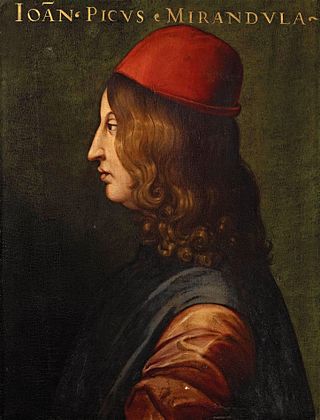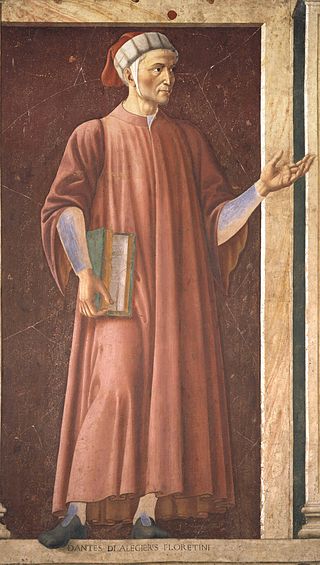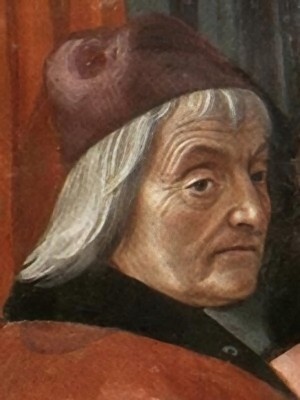Related Research Articles

Marsilio Ficino was an Italian scholar and Catholic priest who was one of the most influential humanist philosophers of the early Italian Renaissance. He was an astrologer, a reviver of Neoplatonism in touch with the major academics of his day, and the first translator of Plato's complete extant works into Latin. His Florentine Academy, an attempt to revive Plato's Academy, influenced the direction and tenor of the Italian Renaissance and the development of European philosophy.
Year 1474 (MCDLXXIV) was a common year starting on Saturday of the Julian calendar.
Year 1433 (MCDXXXIII) was a common year starting on Thursday of the Julian calendar.

Giovanni Pico dei conti della Mirandola e della Concordia, known as Pico della Mirandola, was an Italian Renaissance nobleman and philosopher. He is famed for the events of 1486, when, at the age of 23, he proposed to defend 900 theses on religion, philosophy, natural philosophy, and magic against all comers, for which he wrote the Oration on the Dignity of Man, which has been called the "Manifesto of the Renaissance", and a key text of Renaissance humanism and of what has been called the "Hermetic Reformation". He was the founder of the tradition of Christian Kabbalah, a key tenet of early modern Western esotericism. The 900 Theses was the first printed book to be universally banned by the Church. Pico is sometimes seen as a proto-Protestant, because his 900 theses anticipated many Protestant views.

The Corpus Hermeticum is a collection of 17 Greek writings whose authorship is traditionally attributed to the legendary Hellenistic figure Hermes Trismegistus, a syncretic combination of the Greek god Hermes and the Egyptian god Thoth. The treatises were originally written between c. 100 and c. 300 CE, but the collection as known today was first compiled by medieval Byzantine editors. It was translated into Latin in the 15th century by the Italian humanist scholars Marsilio Ficino (1433–1499) and Lodovico Lazzarelli (1447–1500).

The perennial philosophy, also referred to as perennialism and perennial wisdom, is a perspective in philosophy and spirituality that views religious traditions as sharing a single, metaphysical truth or origin from which all esoteric and exoteric knowledge and doctrine has grown.

Renaissance humanism was a worldview centered on the nature and importance of humanity, that emerged from the study of Classical antiquity. This first began in Italy and then spread across Western Europe in the 14th, 15th, and 16th centuries. During the period, the term humanist referred to teachers and students of the humanities, known as the studia humanitatis, which included the study of Latin and Ancient Greek literatures, grammar, rhetoric, history, poetry, and moral philosophy. It was not until the 19th century that this began to be called humanism instead of the original humanities, and later by the retronym Renaissance humanism to distinguish it from later humanist developments. During the Renaissance period most humanists were Christians, so their concern was to "purify and renew Christianity", not to do away with it. Their vision was to return ad fontes to the simplicity of the Gospels and of the New Testament, bypassing the complexities of medieval Christian theology.

Lorenzo Valla was an Italian Renaissance humanist, rhetorician, educator and scholar. He is best known for his historical-critical textual analysis that proved that the Donation of Constantine was a forgery, therefore attacking and undermining the presumption of temporal power claimed by the papacy. Lorenzo is sometimes seen as a precursor of the Reformation.

Demetrios Chalkokondyles, Latinized as Demetrius Chalcocondyles and found variously as Demetricocondyles, Chalcocondylas or Chalcondyles was one of the most eminent Greek scholars in the West. He taught in Italy for over forty years; his colleagues included Marsilio Ficino, Poliziano, and Theodorus Gaza in the revival of letters in the Western world, and Chalkokondyles was the last of the Greek humanists who taught Greek literature at the great universities of the Italian Renaissance. One of his pupils at Florence was the famous Johann Reuchlin. Chalkokondyles published the first printed publications of Homer, of Isocrates, and of the Suda lexicon.

The designation "Renaissance philosophy" is used by historians of philosophy to refer to the thought of the period running in Europe roughly between 1400 and 1600. It therefore overlaps both with late medieval philosophy, which in the fourteenth and fifteenth centuries was influenced by notable figures such as Albert the Great, Thomas Aquinas, William of Ockham, and Marsilius of Padua, and early modern philosophy, which conventionally starts with René Descartes and his publication of the Discourse on Method in 1637.

Renaissance Latin is a name given to the distinctive form of Literary Latin style developed during the European Renaissance of the fourteenth to fifteenth centuries, particularly by the Renaissance humanism movement. This style of Latin is regarded as the first phase of the standardised and grammatically "Classical" Neo-Latin which continued through the 16th–19th centuries, and was used as the language of choice for authors discussing subjects considered sufficiently important to merit an international audience.

Cristoforo Landino was an Italian humanist and an important figure of the Florentine Renaissance.
The following outline is provided as an overview of and topical guide to the Renaissance:
Platonism, especially in its Neoplatonist form, underwent a revival in the Renaissance as part of a general revival of interest in classical antiquity. Interest in Platonism was especially strong in Florence under the Medici.
The Platonic Academy of Florence was an informal discussion group which formed around Marsilio Ficino in the Florentine Renaissance of the fifteenth century.
Brian P. Copenhaver is Distinguished Professor Emeritus of Philosophy and History at The University of California, Los Angeles. He teaches and writes about philosophy, religion and science in late medieval and early modern Europe.

Francesco Cattani da Diacceto was a Florentine Neoplatonist philosopher of the Italian Renaissance.

Giovanni Mercurio da Correggio was an Italian itinerant preacher, Hermeticist, and alchemist. Due to his bizarre appearance in Rome on Palm Sunday 1484 he has been believed by some scholars to have not actually existed, but this has been contested with other reports that corroborate his eccentricities. His most notable follower was Lodovico Lazzarelli, an Italian humanist poet and alchemist, who writes his accounts of da Correggio in his Epistola Enoch.
The Valori family lived in Florence during the Italian Renaissance. They were prominent in Florentine politics for five generations.
References
- Alexander Broadie. History of Scottish Philosophy. Edinburgh University Press. 2009. Chapter 3. Pages 34 to 46.
- ↑ Kristeller, p. 440
- ↑
- Schmitt, p. 70
- Lepage, p. 27
- ↑ Lorch, p. 214
- ↑ Marsilio Ficino, entry by Christopher Celenza in the Stanford Encyclopedia of Philosophy
- ↑ Laos, p. 158
- ↑ Vredeveld, Harry (1993). "The Ages of Erasmus and the Year of His Birth". Renaissance Quarterly. 46 (4): 754–809. doi:10.2307/3039022. JSTOR 3039022. S2CID 251375496.
- ↑ Biard, Joel. "Major, John (1467–1550)". Routledge Encyclopedia of Philosophy. Retrieved 22 September 2018.
- ↑ Nasr, p. 209